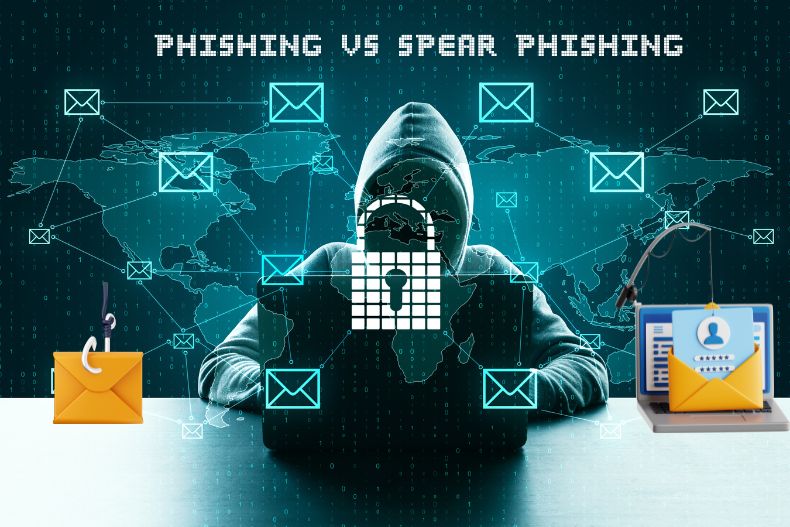In today’s fast-changing world of cybersecurity, one threat continues to rise above the rest: phishing. While many businesses are familiar with the term, few truly understand the different forms it can take.
Even fewer are prepared to protect themselves effectively. Among the most dangerous types is spear phishing, a more targeted and convincing version of phishing. Understanding the difference between these two can be the key to keeping your business safe from serious data breaches.
What Is Phishing?
Phishing is a cyberattack in which a malicious actor pretends to be a trusted source in order to trick someone into revealing sensitive information. This could include passwords, credit card numbers, or access to internal company systems. These attacks are typically sent out in bulk through emails, text messages, or websites that appear legitimate.
The main goal is to exploit human trust rather than technical vulnerabilities. Most phishing attempts are broad and generic. Attackers send them to thousands of recipients, hoping that at least a few will fall for the bait. These messages often have alarming subject lines such as “Your account has been suspended” or “Immediate action required,” which prompt recipients to act without thinking.
Fortunately, many phishing emails can be blocked using spam filters or security software. However, the real risk lies in human error. Without proper training, even one employee clicking a malicious link can open the door to serious consequences.
What Is Spear Phishing?
Spear phishing follows the same concept as phishing but takes it to another level by adding personalization. Instead of sending the same message to a large audience, attackers carefully research their targets. They might look at social media profiles, company websites, or data from previous breaches to craft emails that appear trustworthy and relevant.
A spear phishing email might look like it’s coming from a coworker, your boss, or a known vendor. It may refer to specific projects, deadlines, or internal procedures. These added details make the message feel familiar and authentic, which increases the likelihood that the recipient will trust it.
Because of the effort and research behind them, spear phishing attacks are much harder to detect. They rely on familiarity and timing to trick even careful users. Many large-scale cyber incidents have started with just one successful spear phishing email.
How Are Phishing and Spear Phishing Different?
While both types of attacks aim to steal sensitive data, their methods and levels of sophistication vary significantly:
- Targeting: Phishing casts a wide net, targeting many people with the same message. Spear phishing is highly targeted, aimed at specific individuals or organizations.
- Effort and Complexity: Phishing messages are often simple, filled with errors, and easy to spot. Spear phishing emails are well-researched, personalized, and professional-looking.
- Detection Difficulty: Basic phishing can often be filtered by automated tools. Spear phishing is harder to detect because it closely mimics legitimate communication.
- Delivery Methods: Both rely on email, but spear phishing may also involve phone calls (vishing), social media messages, or realistic fake websites that mirror internal portals.
These differences show why it’s essential for businesses to prepare for both types of threats. Relying only on basic spam filters or antivirus software is not enough to stop a well-crafted spear phishing attempt.
Real-World Examples
To see the difference in action, imagine two scenarios.
In the first, you receive a generic email claiming that your password has expired. It provides a link to “reset” your login, but the link leads to a fake page designed to steal your information. Most users might ignore it, but if even one person clicks, the attack is successful.
Now consider a spear phishing scenario. You receive an email that mentions a specific client, includes details about a project you’re currently working on, and has an attachment labeled “updated contract.” The message appears to come from your manager and is sent at a time when you’re expecting that kind of document. Even cautious employees might fall for this trick, leading to data leaks or financial fraud.
While both attacks are dangerous, spear phishing carries a greater risk because of how tailored and convincing it is.
How to Protect Your Business
Whether you’re facing broad phishing campaigns or targeted spear phishing threats, the foundations of protection remain the same. What matters is how you apply them.
1. Educate Your Team
The most effective defense is a well-informed team. Provide training to help employees recognize suspicious emails and report them. Use real examples and run regular phishing simulations to test their awareness.
2. Use Multi-Factor Authentication (MFA)
If login credentials are stolen, MFA adds an extra layer of security. Requiring a second verification step can prevent attackers from accessing your systems even if they have the password.
3. Strengthen Your Email Security
Invest in advanced email filters that detect spoofed addresses, scan attachments, and flag unusual behavior. These tools reduce the chances of malicious emails reaching your team.
4. Limit Access to Sensitive Information
Make sure employees only have access to the systems and data they need to perform their roles. This reduces the damage an attacker can cause if a single account is compromised.
5. Keep Software Updated
Outdated systems can be a gateway for attackers. Regularly update your software, including operating systems, antivirus programs, browsers, and email clients to fix known vulnerabilities.
Why Small Businesses Should Pay Close Attention
Many small and mid-sized businesses assume they’re not worth targeting. In reality, attackers often prefer them because of weaker security systems and fewer internal safeguards. A single phishing attack can result in major financial losses, legal issues, and lasting damage to a company’s reputation.
That’s why it’s so important to understand the risks—not just the general concept of phishing, but the deeper danger posed by spear phishing. This isn’t just about technology. It’s about building a culture of security, where every team member is aware and alert.
Need Help Securing Your Business?
If you’re concerned about phishing, spear phishing, or any other cybersecurity threats, it may be time to speak with experts. One trusted option is Sentry, a cybersecurity company based in El Paso, TX. They specialize in services like threat monitoring, employee training, and incident response planning.
Their team has experience working with small and mid-sized businesses, helping them build stronger defenses and avoid the most common risks. If you’re ready to strengthen your digital protection, Sentry can help you move forward with confidence.













